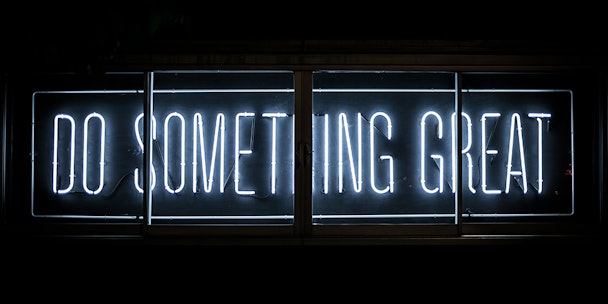Brave businesses learn to love failure
Bravery is an attractive quality in business. Culturally, we venerate the maverick, the bold decision maker who takes a gamble that pays off. More to the point, we know that being brave sells. But, in pressured commercial environments, so few of us do it. The reason? We can’t accept that true bravery often means failure before it means success.

Brave businesses learn to love failure
Google ‘failure before success’ and you’ll be met with a litany of articles and listicles about outliers whose career arcs took a severe dip before they achieved any kind of notoriety in their field. Everyone from Van Gogh to Churchill makes an appearance. And while some of these examples are rags to brags stories, told by members of the great and good who are keen to let everyone know that things weren’t always so rosy, others demonstrate a common thread that unites the most creative we’ve ever had the privilege to know:
Successful people are brave enough to try, fail and get up again.
The principle applies to business as well. And I suspect most corporate leaders know that. But there’s a difference between liking the Beckettian ‘Fail again, Fail better’ mantra and allowing it to have a place in a company that’s got shareholders looking for results and employees looking for job security.
The problem with bravery, for many, is that it’s intrinsically tied to uncertainty. Like a teenager asking out a first date, you’re putting yourself out there in front of everyone, and you very well might fall flat on your face. It’s generally so much easier to do that thing you always do, knowing pretty well that it’ll get you the same results you always get, rather than try to execute a big idea, when the risk factor is that much greater (the teenage equivalent of which is probably hanging around playing computer games with your friends).
But when we’re faced with so much ‘me too’ content and corporate messaging that seems to have been run through a cliché engine, backing bravery becomes vital. Particularly when establishing a voice and brand personality that’s worth paying attention to, as well to creating messages that elevate the brand above its competitors. As George RR Martin wrote, ‘fear cuts deeper than swords’.
Because of the make up of modern business, marketing is more of a battleground for bravery than most other areas. It’s probably not wise to tell the finance team to be a bit more cavalier with the figures, or to ask HR to take more risks in its hiring strategy.
A desirable modern marketer is an ideas-led conceptual thinker, with a creative streak running from head to foot. And – crucially – they will be brave. Businesses fall over themselves to employ these people. Particularly in B2B where the compulsion to try new things, break habits and differentiate is growing stronger. But experience tells me that today a sizeable number of marketers don’t feel their bravery is backed up at board level. There’s a gap between the business’ intentions and its actions. And while they hear ‘we want to be brave and innovative’, they end up doing a lot of the same old.
More concerning still is that many B2B marketers simply don’t feel as though they can challenge thinking and overly safe decision-making. If a senior manager or a company figurehead says no to a good, brave idea, they’re more likely to nod in unhappy, bemused agreement than they are to say, "actually, I’m not sure you’ve got any idea what you’re talking about".
The upshot, unsurprisingly, is that creative minds get bored and leave. They go to businesses where the leadership supports bravery. They do good, exciting work and they succeed, leaving their old place of work no doubt wondering where they’re continuously going wrong and why none of their clients are listening to them.
The difference between the two business mindsets brings me back to the start of this piece: Failure. Bravery means accepting it, taking it on the chin and learning from it. It means willingly ploughing resources into projects that might turn out to be better ideas on paper than they are in the real world. For some, it may even mean actively encouraging staff to bring forward suggestions that have practically no chance of making it, but are nonetheless a valuable creative exercise.
It’s all in the name of learning, developing and ensuring (as much as possible) that the next big idea gets the business that bit closer to a competitive advantage. But to get there all of us in business must understand and accept that failure almost necessarily precedes success.
Pete Hendrick, Director, Octopus Group.
Content by The Drum Network member:

Octopus Group
We are Octopus Group, the home of Brand To Sales.
We have a 15-year heritage of helping blue chip and fast-growth technology and professional services brands...

